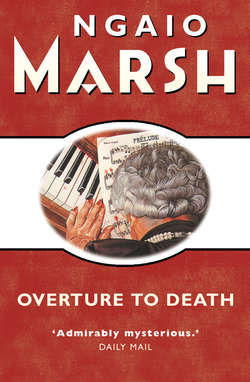Читать книгу Overture to Death - Ngaio Marsh, Stella Duffy - Страница 15
IV
ОглавлениеThere was no doubt that the play had been well chosen. With the exception of one character, it practically cast itself. The squire was to play the General; Miss Prentice, the Duchess; Miss Campanula, of whom everybody felt extremely frightened, was cast for Mrs Arbuthnot, a good character part. Miss Campanula, when offered this part, replied ambiguously:
‘Who knows?’ she looked darkly. ‘Obviously, it is not for me to say.’
‘But you will do it, Idris?’ murmured Miss Prentice.
‘I have but one comment,’ rejoined Miss Campanula. ‘Wait and see.’ She laughed shortly, and the rector, in a hurry, wrote her name down opposite the part. Dinah and Henry were given the two young lovers, and Dr Templett said he would undertake the French Ambassador. He began to read some of the lines in violently broken English. There remained the part of Hélène, a mysterious lady who had lost her memory and who turned up in the middle of the first act at a country house-party.
‘Obviously, Selia,’ said Dr Templett, ‘you must be Hélène.’
‘No, no,’ said Mrs Ross, ‘that isn’t a bit what I meant. Now do be quiet, Billy, or they’ll think I came here with an ulterior motive.’
With the possible exception of the squire, that was precisely what they all did think, but not even Miss Campanula had the courage to say so. Having accepted Mrs Ross’s play they could do nothing but offer her the part, which as far as lines went, was not a long one. Perhaps only Dinah realized quite how good Hélène was. Mrs Ross protested and demurred.
‘If you are quite sure you want me,’ she said, and looked sideways at the squire. Jocelyn, who had glanced through the play and found that the General had a love scene with Hélène, said heartily that they wanted her very much indeed. Henry and Dinah, conscious of their own love-scenes, agreed, and the rector formally asked Mrs Ross if she would take the part. She accepted with the prettiest air in the world. Miss Prentice managed to maintain her gentle smile and Miss Campanula’s behaviour merely became a degree more darkly ominous. The rector put on his glasses and read his notes.
‘To sum up,’ he said loudly. ‘We propose to do this play in the Parish Hall on Saturday 27th. Three weeks from tonight. The proceeds are to be devoted to the piano-fund and the balance of the sum needed will be made up most generously by Mr Jocelyn Jernigham. The Committee and members of the YPFC will organize the sale of tickets and will make themselves responsible for the – what is the correct expression, Dinah?’
‘The front of the house, Daddy.’
‘For the front of the house, yes. Do you think we can leave these affairs to your young folks, Miss Campanula? I know you can answer for them.’
‘My dear man,’ said Miss Campanula, ‘I can’t answer for the behaviour of thirty village louts and maidens, but they usually do what I tell them to. Ha!’
Everybody laughed sycophantically.
‘My friend,’ added Miss Campanula, with a ghastly smile, ‘my friend Miss Prentice is president. No doubt, if they pay no attention to me, they will do anything in the world for her.’
‘Dear Idris!’ murmured Miss Prentice.
‘Who’s going to produce the play?’ asked Henry. ‘I think Dinah ought. She’s a professional.’
‘Hear, hear!’ said Dr Templett, Selia Ross and the squire. Miss Prentice added rather a tepid little, ‘Of course, yes.’ Miss Campanula said nothing. Dinah grinned shyly and looked into her lap. She was elected producer. Dinah had not passed the early stages of theatrical experience when the tyro lards his conversation with professional phrases. She accepted her honours with an air of great seriousness and called her first rehearsal for Tuesday night, November 9th.
‘I’ll get all your sides typed by then,’ she explained. ‘I’m sure Gladys Wright will do them, because she’s learning and wants experience. I’ll give her a proper part so that she gets the cues right. We’ll have a reading and if there’s time I’ll set positions for the first act.’
‘Dear me,’ said Miss Prentice, ‘sounds very alarming. I’m afraid, Dinah dear, that you will find us all very amateurish.’
‘Oh, no!’ cried Dinah gaily. ‘I know it’s going to be marvellous.’ She looked uncertainly at her father and added, ‘I should like to say, thank you all very much for asking me to produce. I do hope I’ll manage it all right.’
‘Well, you know a dashed sight more about it than any of us,’ said Selia Ross bluntly.
But somehow Dinah didn’t quite want Mrs Ross so frankly on her side. She was aware in herself of a strong antagonism to Mrs Ross and this discovery surprised and confused her, because she believed herself to be a rebel. As a rebel, she should have applauded Selia Ross. To Dinah, Miss Prentice and Miss Campanula were the hated symbols of all that was mean, stupid, and antediluvian. Selia Ross had deliberately given battle to these two ladies and had won the first round. Why, then, could Dinah not welcome her as an ally after her own heart? She supposed it was because, in her own heart, she mistrusted and disliked Mrs Ross. This feeling was entirely instinctive and it upset and bewildered her. It was as if some dictator in her blood refused an allegiance that she should have welcomed. She could not reply with the correct comradely smile. She felt her face turning pink with embarrassment and she said hurriedly:
‘What about music? We’ll want an overture and an entr’acte.’
And with those words Dinah unconsciously rang up the curtain on a theme that was to engulf Pen Cuckoo and turn Shop Windows from polite comedy into outlandish, shameless melodrama.
